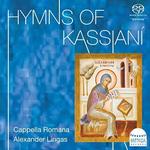|
Back
04/19/2021
“Hymns of Kassianí”
Kassianí: Hymns for Christmas – Hymns from the Triodion and Holy Week
Cappella Romana, Alexander Lingas (music director and founder)
Recording: The Madeleine Parish, Portland, Oregon (January 13-17, 2020) – 76’40
Cappella Records CR422 SACD – Booklet in Greek and English

   
Considering that Greek civilization provided the building blocks of European culture, Greek music has been sadly ignored by music lovers in the West. That omission is being remedied by Cappella Romana, an ensemble which is transforming the dry, brittle pages of ancient Byzantine scores into living musical lyricism with a broad international appeal.
Cappella Romana, a group of 15 singers founded and directed by Orthodox music scholar Alexander Lingas, already has brought more than a half dozen albums. Their latest album provides a stunning entrée to the work of Kassianí, an Orthodox woman, monastic and saint from the 9th century, who is considered the earliest female composer from whom we have extant music. An abbess, poet and hymnographer, Kassianí is one of the first composers to have left for future generations of scholars a collection of musical scores from the end of the Middle Ages. Indeed, works such as those by this prolific musical craftswoman may have contributed to the more enlightened culture which followed the reign of Charlemagne.
Reading about the many accomplishments of this powerful woman, who founded a convent to the west of Constantinople by 843 CE, one is reminded of an extraordinary woman composer of the 12th century, Hildegard of Bingen. But in addition to their different faith traditions (Orthodox vs. Roman Catholic), there are enormous differences in their compositional styles which, if not already undertaken, would make a fascinating topic for a thesis or dissertation.
This new album offers several of Kassianí’s works for Christmas, the Triodion (the fourth Sunday before Lent until Easter) and Holy Week (the week up to and including Easter Sunday). While referred to as hymns, the 10 selections on this album include several works that are much longer and more complex than traditional hymns, such as the “Kalophonic (chant using a series of elongated melodies and repetition) Sticheron” (an Orthodox hymn used in the morning and evening) on the text which begins, “Lord, the woman found in many sins...” (The shorter setting of this hymn, on the ninth track of this album, is as close as we can get to Kassianí’s original composition.)
Secular readers of this Penitential hymn, which is sung for more than 25 minutes, may be startled or delighted by its vivid erotic imagery and passionate emotionalism. This famous work is also known as the Hymn of Kassianí, sung once a year during the Gospel reading on the morning of Holy Wednesday.
While individuals with knowledge of the varieties of chant and church modes will enjoy this album on an intellectual or theological level, anyone sensitive to song will discover in Kasianí’s works a rare musical aesthetic. Male and female choruses alternate and complement each other, with a persistent drone underlying their voices. Soloists sing sinuous melodic lines that drop suddenly a half tone to the tonic or tremble ever so briefly like a dragonfly paused in the air. Notes turn as seductively as a Middle Eastern dancer, then remember they are in a place of divine meditation. There is an organic yeastiness about this music and the way it not only spreads like a benign invasive plant, but insinuates itself through the listener’s ear into the reaches of the soul.
As those of us in the West increasingly supplement our thoughts and prayers with practices of Eastern-based mindfulness and contemplation, this album provides a new tool not only for self-examination but for indulgence in the rich sensual heritage of Byzantine singing. Kassianí’s songs demand to be heard, and we are enriched by listening to them, especially in this authentic and deeply expressive collection.
Linda Holt
|